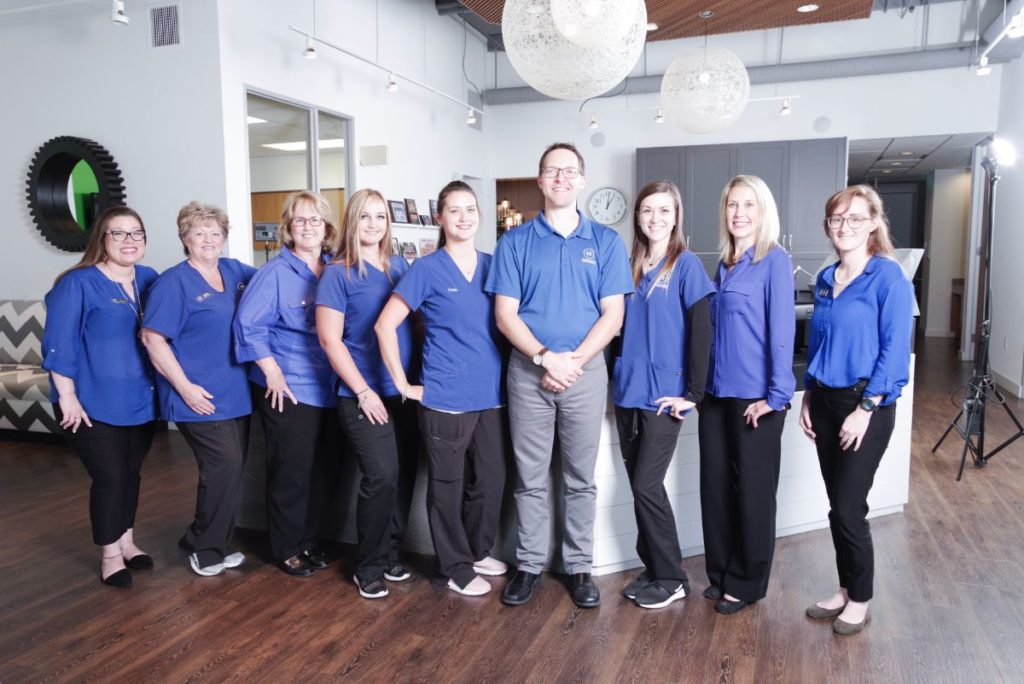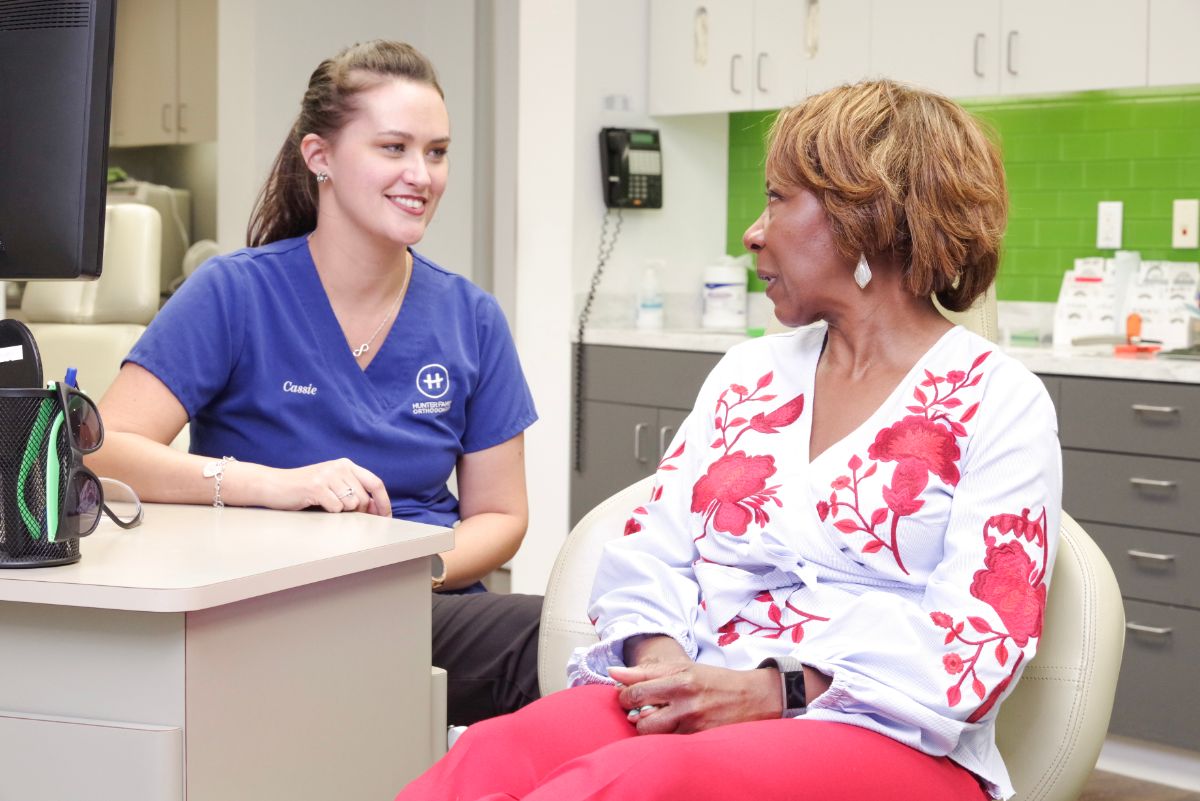Most of us are guilty of snoring every once in a while, but if you find yourself snoring every time you sleep, you may be suffering from chronic snoring. This isn’t just an annoying habit that you and your partner have to deal with. It can cause serious health problems if left untreated and can also be a symptom of deeper issues. Obstructive sleep apnea is a sleep disorder that can impact your breathing, health, energy levels, and overall sense of well-being. It may even have a negative effect on anyone sleeping near you! Here at Hunter Family Orthodontics, we’re taking a look at how orthodontics can help treat snoring and sleep apnea!
What Causes Snoring?
According to the National Sleep Foundation, 37 million Americans are frequent snorers. There are many different causes of snoring, ranging in severity. Determining the cause of your snoring and how frequently it occurs will help Dr. Hunter provide treatment that is right for you.
The root cause of all snoring is obstructed airways. If the air you take in through your nose or throat has trouble traveling smoothly, you’ll have a snore as the air pushes its way through. Some of the causes of obstructed airways include:
Sleep Style
You may notice that you or your partner only snore when they’re sleeping on their back, or on a specific side but not in other positions. This is called “side-dependent snoring”. This isn’t a serious issue, which is good news for you. Once you’re aware of the problem, you can train yourself to sleep in a different position and fix the snoring problem.
Aging
As you age, the muscles in your throat and neck can behave differently in your sleep. They may relax more than they used to, making them more likely to vibrate when you inhale. The way your sleeping habits change as you age can also affect snoring. You may start sleeping in a different position, which also puts your airwaves in a different position. Even if you didn’t experience frequent or chronic snoring when you were younger, these issues may develop later in life.
Alcohol and Medication Use
While an evening glass of wine or scotch may help you relax and get to sleep easier, it can also contribute to snoring. Alcohol can be a strong muscle relaxer, and when your throat muscles are more relaxed, it’s more likely for them to vibrate and cause snoring. Taking a muscle relaxer before bed can have the same effect. If alcohol or medication use is the cause of your snoring, the simple solution is to stop using them. If this fixes your snoring, you most likely don’t need to worry about the more severe complications of snoring.
Nose and Throat Conditions
This cause of snoring is more serious, but it’s not difficult to correct. A deviated septum, nasal polyps (soft growths that line the insides of the sinuses), or even swollen or congested sinus from a common cold or sinus infection can cause snoring either because your airways are blocked and you’re having to work harder for the same amount of breath, or you are breathing through your mouth when you wouldn’t otherwise. When you’re breathing through your mouth, enlarged tonsils, or adenoids can block your airway and cause snoring.

The Dangers of Snoring
In addition to the less serious and easily treated causes of snoring, there are some serious causes and complications that can come from chronic snoring. One of the most common and concerning conditions associated with snoring is Obstructive Sleep Apnea (OSA).
An OSA episode is when your airway completely closes and pauses your breathing. Your body will usually jolt you awake for a few seconds to correct the problem. You probably won’t notice or remember each time you wake up, even though it may be happening between 5 and 30 times each hour.
To accurately diagnose sleep apnea, Dr. Hunter and your primary care physician will look for the following symptoms:
- Witnessed breathing pauses during sleep
- Excessive daytime sleepiness
- Difficulty concentrating
- Morning headaches
- Sore throat upon awakening
- Restless sleep
- Gasping or choking at night
- High blood pressure
- Chest pain at night
- Your snoring is so loud it’s disrupting your partner’s sleep
- In children, poor attention span, behavioral issues, or poor performance in school
Obstructive Sleep Apnea can have daily and long-term consequences. Daily side-effects include daytime sleepiness, frequent frustration or anger, or difficulty concentrating. Since you’re waking up throughout the night, you aren’t getting quality sleep, and it will negatively impact your day if the same way staying up into the early morning hours would.
Serious long-term health issues include:
250% higher risk of a fatal heart attack. Obstructed breathing means that less oxygen is circulating through your body for a third of your life. This puts a lot of strain on your heart and arteries. This increased stress poses a much greater risk of failure.
67% greater chance of developing a stroke. Much like the risk of heart failure, the lack of oxygen circulating through your body increases your chance of stroke significantly.
40% greater chance of developing high blood pressure. The sudden drops of blood oxygen levels that happen as a result of OSA can increase blood pressure and put added stress on your cardiovascular system.
Treating sleep apnea
Obstructive sleep apnea is more common than you might think, affecting about one out of every five Americans. Out of the dozens of patients we see daily here at Hunter Family Orthodontics, anywhere from 4-6 are likely to be affected by sleep apnea. That’s why our practice is committed to doing proper screenings for this disorder for patients in the Woodlands! Our team is familiar with the common signs and symptoms, and we look at everything from teeth wear and tongue position to airway size and dental occlusion to determine if there are any risk factors present for sleep apnea.
Once we have completed a screening evaluation, patients suspected of having obstructive sleep apnea will be asked to fill out a thorough questionnaire. This gives us more information on their sleeping habits, fatigue levels, snoring or choking, and any episodes they can remember where they stopped breathing while sleeping. If there are significant risk factors present, we will generally recommend they have an official sleep test performed at home or in a lab. The results from this will give us the critical data we need to diagnose obstructive sleep apnea. With a diagnosis in place, Dr. Hunter can move forward with treatment!

Get a good night’s sleep with Hunter Family Orthodontics
Are you tired of feeling, well, tired? We can help! Diagnosing and treating obstructive sleep apnea can change your life and leave you feeling rested and energized each morning. Our customized oral appliances are simple to use while you sleep, and restore your breathing without bulky masks and machines.
If you are suffering from symptoms associated with sleep apnea, we encourage you to get in touch and schedule an appointment with us. Dr. Hunter and our talented team will be happy to help you take the first steps towards quiet nights of restful sleep for you and your whole family!

